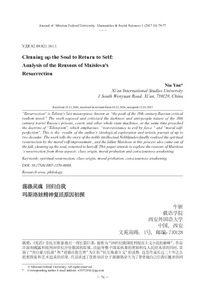Cleaning up the Soul to Return to Self: Analysis of the Reasons of Maislova’s Resurrection
Скачать файл:
URI (для ссылок/цитирований):
https://elib.sfu-kras.ru/handle/2311/30760Автор:
Yan, Niu
Янь, Ню
Дата:
2017-01Журнал:
Журнал Сибирского федерального университета. Гуманитарные науки. Journal of Siberian Federal University. Humanities & Social Sciences;2017 10 (1)Аннотация:
“Resurrection” is Tolstoy’s last masterpiece, known as “the peak of the 19th century Russian critical realism novel.” The work exposed and criticized the darkness and anti-people nature of the 19th century tsarist Russia’s prisons, courts and other whole state machines, at the same time preached the doctrine of “Tolstoyism”, which emphasizes “non-resistance to evil by force “ and “moral self-perfection”. This is the results of the author’s ideological exploration and artistic pursuit of up to two decades. The work tells the story of the noble intellectual Nekhlyudov finally realized the spiritual resurrection by the moral self-improvement , and the fallen Maislova in this process also came out of the fall, cleaning up the soul, returned to herself. This paper intends to explore the reasons of Maislova ‘s resurrection from three aspects: class origin, moral probation and consciousness awakening Роман «Воскресение» является последним эпическим произведением Л.Н. Толстого, известным как «вершина русского критического реализма романов XIX века». Это произведение посвящено выявлению и критике царской тюрьмы, суда и государственной машины, направленной против народа. Данное сочинение мы анализируем с позиции проповедуемых идей «толстоизма», заключающихся в необходимости «постоянного самосовершенствования»

